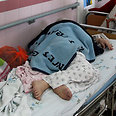
Israel has fewer hospitals than Yemen
World Health Organization report reflects grim situation of Israeli health system, with small number of hospitals, CT units and specialists. Figures place Jewish state way below most Western states, alongside countries like Ethiopia, Zambia, Congo
The annual report, World Health Statistics 2013, points to dramatic progress in improving health in the poorest countries and narrowing the gaps between countries with the best and worst health status in the past two decades. For example, deaths from HIV and other infectious diseases dropped significantly in third world countries as well.
According to the report, every year around 15 million babies are born preterm (before 37 weeks of pregnancy) and one million of them die. Preterm birth is the world’s leading killer of newborn babies and the second most important cause of death (after pneumonia) in all children aged less than five years.
In the past few decades, however, there has been a substantial reduction in the stillbirth rate maternal deaths thanks to hospital care. In 1990, countries in the bottom category had on average 915 more maternal deaths per 100,000 live births compared to countries in the top category. In 2010, this had narrowed to 512 per 100,000 live births.
In addition, tuberculosis (TB) deaths have decreased globally by more than 40% since 1990 and the trend indicates that this will reach 50% by 2015.
The report compares health infrastructures around the world, reflecting Israel's grim situation, which appears to be particularly serious in terms of the number of hospitals in the country: According to the comparison, Israel has 0.6 hospitals per 100,000 members of its population, putting the Jewish state around the 80th place, way below European, Far East and Arab countries, and alongside third world countries like Zambia, Afghanistan, Ethiopia, Senegal and Bangladesh.
A comparison of hospital beds around the world ranks Israel in the 70th place, with 34 beds per 10,000 residents, way below most of the world's countries, including Japan (which has 137 beds per 10,000 residents), South Korea (132), Russia (97), Poland (66), Belgium (65) and the Czech Republic (70).
0.8 psychiatrists per 10,000 people
If you've ever tried scheduling an appointment for a CT scan or MRI and had to wait six months, the next figure won't surprise you. The rate of Israel's computed tomography units is among the lowest in the world, standing at 7.8 per a million people, way below Iceland (40), Denmark (24), Cyprus (21.7), Finland (20), Estonia (15), Serbia (13.2), Slovenia (12.3), Turkey (15) and Uruguay (13), and not far from Bangladesh (7.3).
Long wait for radiotherapy is a normal thing in Israel, as the figures show: The number of radiotherapy units for cancer patients remains low, standing at 3.5 per million population, way below Monaco (28.2), the United States (12.8), Switzerland (9.8), Japan (7.2), New Zealand (7.1), France (6.8), Malaysia (6.7), Iceland (6.2), Latvia (4.9) and dozens of other countries.
Israel's health workforce is not a source of pride either: The country has 31.1 physicians per 10,000 people, putting Israel in the 31st place, after Lebanon, Georgia, Hungary and Italy, but before Canada, Britain and the US. The number of nursing and midwifery personnel is low too, standing at 49.7 per 10,000 people, putting Israel in the 46th place.
The situation is particularly grave when it comes to specialists. According to the report, the number of psychiatrists in Israel stands at 0.8 per 10,000 people, putting Israel around the 30th place in the world.










